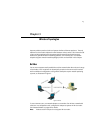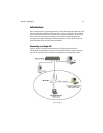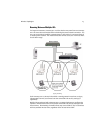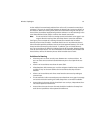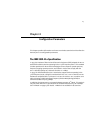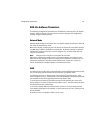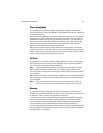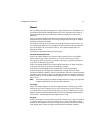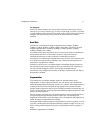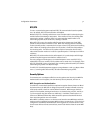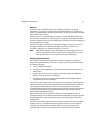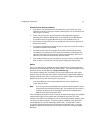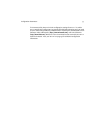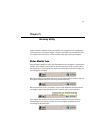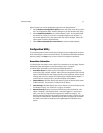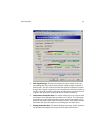Configuration Parameters 31
For Singapore:
An 802.11a network adapter can use one of four Channels: Channel 36 (5.18 GHz),
Channel 40 (5.20 GHz), Channel 44 (5.22 GHz), or Channel 48 (5.24 GHz). If you wish
to install multiple Ad Hoc networks in the same vicinity, Proxim recommends that you
configure each network with a unique Channel to avoid interference between
networks.
Send Rate
The IEEE 802.11a specification supports eight data rates: 54 Mbps, 48 Mbps,
36 Mbps, 24 Mbps, 18 Mbps, 12 Mbps, 9 Mbps, and 6 Mbps. Harmony’s 2X mode
supports eight data rates: 108 Mbps, 96 Mbps, 72 Mbps, 48 Mbps, 36 Mbps,
24 Mbps, 18 Mbps, and 12 Mbps.
As a mobile client travels away from an 802.11a Access Point (when in Infrastructure
mode) or from other 802.11a nodes (when in Ad Hoc mode), the data rate
automatically decreases in order to maintain a usable radio connection.
For example, in an Infrastructure network that is using 2X mode, a client that is close
to an Access Point may operate at 108 Mbps, but a client that is far away from the
Access Point may operate at 12 Mbps.
By default, a Harmony 802.11a network adapter automatically adjusts the transmit
rate depending on the mode of operation (802.11a-compliant or 2X). However, you
can also manually configure a specific send rate that an adapter will use.
For example, if you configure the Send Rate to 36 Mbps, a Harmony 802.11a adapter
will operate at 36 Mbps.
Fragmentation
The Harmony 802.11a network adapters support an optional feature called
Fragmentation. In harsh radio environments, 802.11a devices may have difficulty
transmitting large packets that exceed a certain size. However, when Fragmentation is
enabled, an 802.11a device can break up large packets into a number of smaller
packets (called “fragments”) that can be successfully transmitted to another 802.11a
device. The receiving 802.11a device then reassembles the original packet once it has
received all of the fragments.
You can configure a Harmony 802.11a network adapter to never use Fragmentation or
to fragment only those packets that exceed a certain size. For example, if the
Fragmentation Threshold is set to 1000 Bytes, then a sending radio will fragment any
packet 1000 Bytes or larger before transmitting.
The Fragmentation Threshold supports a range between 256 and 2345 Bytes. If set to
256, then a sending radio will fragment all packets 256 Bytes or larger. If set to 2345,
then a sending radio will fragment only those radio packets that are 2345 Bytes or
larger.
By default, Fragmentation is disabled.



